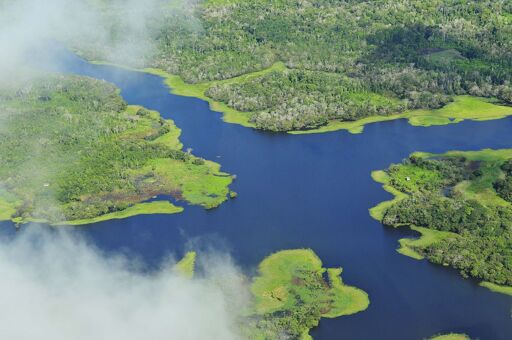practical examples of this, if you’re curious, include the Tūtohu Whakatupua (which declared the Whanganui River and tributaries as a legal entity), the agreement around Mount Taranaki (which grants it legal personhood), and the invalidated Lake Erie Bill of Rights (passed by Toledo, OH and was designed to allow residents to bring lawsuits on behalf of Lake Erie to protect it)
Law is entirely man made and purely a concept to allow for formal processes that we agree on as necessary to maintaining an ethical society. I see no reason why we can’t recognize natural entities as having legal rights. In fact, it’s a pretty good idea, markedly better than deciding that corporations are people.
markedly better than deciding that corporations are people.
Came here to say exactly this. However, remember that corporations are people because it’s a way for the executives to escape personal accountability and responsibility for any decision they make. Extending the same logic to nature, personhood is likely to be abused. People would do it since nature won’t complain or litigate back.
I admit this analysis is off the cuff.
I think it could be helpful as a form of defense and protecting nature, but there’s the other side to the coin, which is, how do you then “hold nature accountable” for its “actions?” By that I mean natural disasters. For instance, if a mudslide occurs, how do you hold that mountain accountable? Do the victims of the mudslide then have the right to seek damages from that mountain? Could compensation come in the form of granting the victims the right to cut down all the trees on the other side of the mountain so that the timber can be harvested to compensate the victims for that natural disaster?
I think granting personhood is going to create issues from a legal standpoint and coming up with consistent precedents around agency and action. I’m not sure that this avenue of approach necessarily solves the problem at hand, which seems to be that we’re trying to prevent human beings from destroying the Earth. In that sense, it seems like the most effective and more direct response is to restrict the actions of humans rather than granting personhood to something else.
but there’s the other side to the coin, which is, how do you then “hold nature accountable” for its “actions?” By that I mean natural disasters.
No, this is not part of legal personhood. Essentially every legal system has a version of juridical personhood (i.e. a personal entity only in legal proceedings), and they do not allow for this kind of ad absurdam approach to the legal liabilities of an entity. They spell out exactly what kind of liabilities an entity is subject to, and natural disasters have never been put forth as part of non-human natural entities.
Woah, you’re coming in a little bit hot, there. The post asked for community thoughts on granting “personhood” to natural entities, and that’s all I did.
Also, the parallel I was making wasn’t to say that natural disasters would gain personhood, but rather natural disasters could be considered tortious conduct by a natural entity, which this post contemplated as gaining personhood. The point I was making was simply to suggest there are some thought exercises about tort law that are worth considering before moving forward. It isn’t absurd to suggest the possible parallels between a legal entity (I.e., corporation) being proximally related to tortious conduct and a natural entity, like a mountain, being between proximally related to what might be considered tortious conduct (e.g., a mudslide) under the proposed legal regime.
the parallel I was making wasn’t to say that natural disasters would gain personhood, but rather natural disasters could be considered tortious conduct by a natural entity
Yes, I understood what you were saying. That’s what I was referring to when I mentioned “liabilities” of the natural entities: mountains are not liable for mudslide damages, lakes are not liable for flooding or rogue waves, etc. This is not a purely hypothetical area of law, these laws have already been enacted in various places, and none of the laws put forth have suggested any kind of liability on the part of the natural entities for natural disasters (or defined any other means of engaging in tortious conduct, on the part of the natural entities).
Look, I’m not going to get into a back-and-forth with you about this because it’s not my area of expertise, but a cursory glance at the Wikipedia article, which was “supplemental reading” for the question of what people thought about the idea, suggests that the underlying legal mechanisms (admittedly, I’m analyzing this from jurisprudence of the United States so terminology and precedents may differ) have to do with granting standing to individuals and communities that otherwise might not have a direct enough connection to assert an injury. Some references, like to the Ponca, suggest that the goal is accomplished by enacting new criminal statutes; others by granting private citizens the right to sue those that harm nature.
The legal mechanisms are not rooted in granting “personhood,” but rather providing means of protecting nature, which is a completely different legal approach. Nevertheless, the “personhood” approach was an interesting one, and because this is Beehaw, I thought entering the conversation could be productive and thought-provoking exercise.
Again, I’m not going to spend anymore time researching source materials, but you have conflated “personhood” with environmental protection laws, which I was not addressing, and you have come off as rather condescending. If we had been talking about conventional environmental protection laws, I would have agreed with you that the law doesn’t associate legal liabilities with nature, but instead, you hijacked the conversation and changed the discussion. You suggested that the statement I made before you changed it was addressed to your new conversation, and suddenly what I said was “absurd.”
If we are actually talking about the premise of legal personhood rather than just ways to protect the environment, then the parallels to considering that a concept, like a corporation, could have legal rights and liabilities associated with agency are actually really analogous, and in the litigious society we live in, would become a matter for a court to decide.
I wasn’t trying to be condescending or antagonizing; this actually is an area I have knowledge about, and I was just trying to be helpful.
and suddenly what I said was “absurd.”
No, I said that laws related to this do not allow for “ad absurdum” interpretations of liability. The liabilities of juridical entities (legal persons) are laid out very explicitly within a given jurisdiction’s laws, and certainly would not cover things which would otherwise already qualify legally as “acts of god” (i.e. natural disasters).
deleted by creator
This is a very important legal tool that people have been using around the world to be able to bring suit against people and companies who cause damage to nature.
In most countries, in order to sue someone you require legal standing, which usually involves showing that you or someone or something you have control or ownership of, was caused harm by the defendant.
This status, as it’s being used, specifies some set of entities who can sue on behalf of the juridical entity, for harm done to it. This greatly increases the ability of people to hold companies accountable for environmental damages.
recognize [natural] entities as having “personhood” or legal rights comparable to humans
I’m against anything but humans being granted the same rights as humans.
We can discuss what legal rights should be granted to which entities, or which entities should share some rights, but conflating different entities like humans, dogs, corporations, mountains, or AIs, as one and the same thing, is a recipe for disaster.
It sounds to me like a case of “to someone with a hammer, everything looks like a nail”.
These do not grant anything human rights, they grant things the status of legal personhood, which has a very specific set of actions that an entity is legally acknowledged as being able to take, such as signing contracts and owning property, as 2 examples. They are sometimes called juridical persons.
You can’t be charged with assault against a company for punching a building, or kidnapping or illegal detainment for stealing an object granted legal personhood.
It doesn’t literally treat (or conflate) these things as being the same as humans.
Amending the constitution to grant rights to nature is compelling and logical from multiple perspectives, including economic ones. Nature should be regarded as essential infrastructure, the foundation upon which all other facets of society depend.
It would be a fitting testament to the challenges we face.
Isn’t there also a tree in London that owns itself?
i’m not aware of one; you might be thinking of the Athens, GA Tree That Owns Itself–but as far as i’m aware none of these types of trees are actual examples of a plant with personhood/legal rights/etc. as in the examples i gave
When you get down to it, law, society, what have you, exists for the purpose of making things better for people that could be overlooked or trampled otherwise. Granting legal personhood to nature achieves that in a number of way







